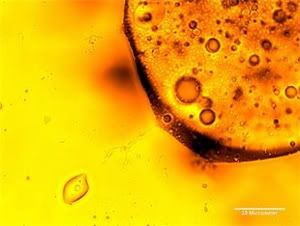
photo credit Reuters & Hoi-Ying Holman Group/Handout
Okay, wait wait wait.
I literally JUST posted this article about how the plume is still there. Not five minutes later, someone sends me this article saying it's been magically eaten. No wonder people are so confused with the news in the Gulf.
So, this article says it's gone. Yay! Granted, it is about two months after the initial study from the other article I posted. Scientists did say the microbes are "infamous for being unpredictable."
This article says that the microbes have "degraded the hydrocarbons so efficiently that the plume is now undetectable."
Here's a weird quote:
"Another factor was the consistency of the oil that came from the Macondo wellhead: light sweet Louisiana crude, an easily digestible substance for bacteria, and it was dispersed into tiny droplets, which also makes it more biodegradable."
MMMMM, OIL! POUR ME A BIG OLE MUG O' THAT! Delicious.
Finally, here's some clarification:
"These latest findings may initially seem to be at odds with a study published last Thursday in Science by researchers from Woods Hole Oceanographic Institution, which confirmed the existence of the oil plume and said micro-organisms did not seem to be biodegrading it very quickly.
However, Hazen and Rich Camilli of Woods Hole both said on Tuesday that the studies complement each other.
The Woods Hole team used an autonomous robot submarine and a mass spectrometer to detect the plume, but were forced to leave the area in late June, when Hurricane Alex threatened. At that time, they figured the plume was likely to remain for some time.
But that was before the well was capped in mid-July. Hazen said that within two weeks of the capping, the plume could not be detected, but there was a phenomenon called marine snow that indicated microbes had been feasting on hydrocarbons.
As of Tuesday, there was no sign of the plume, Hazen said."
Alright, that settles it. Job well done, little guys!
Full article here (Reuters)
Original article here (National Geographic)
No comments:
Post a Comment